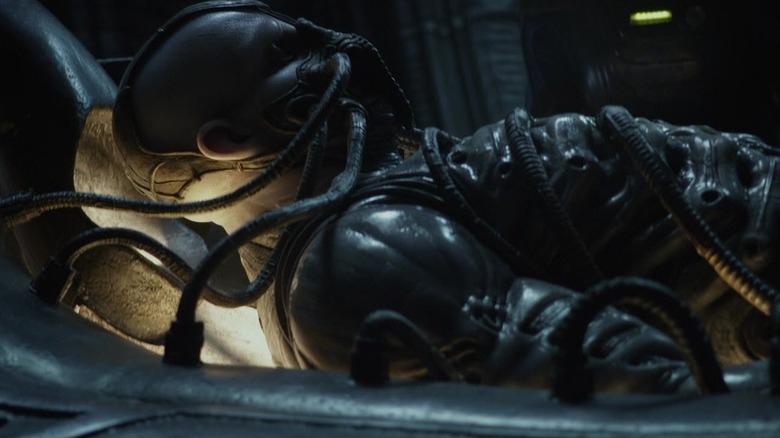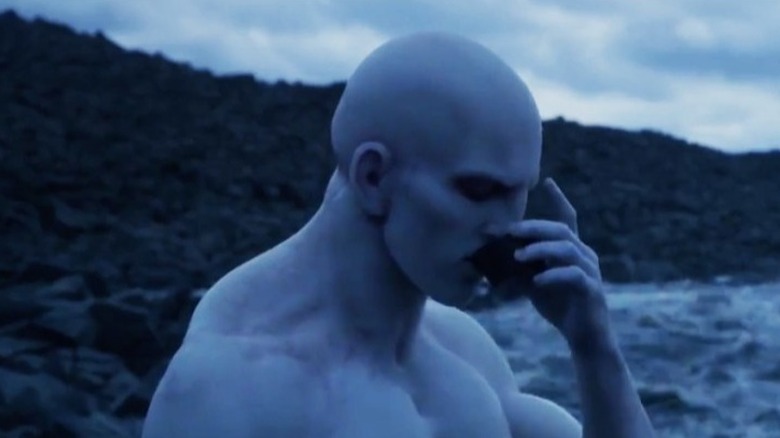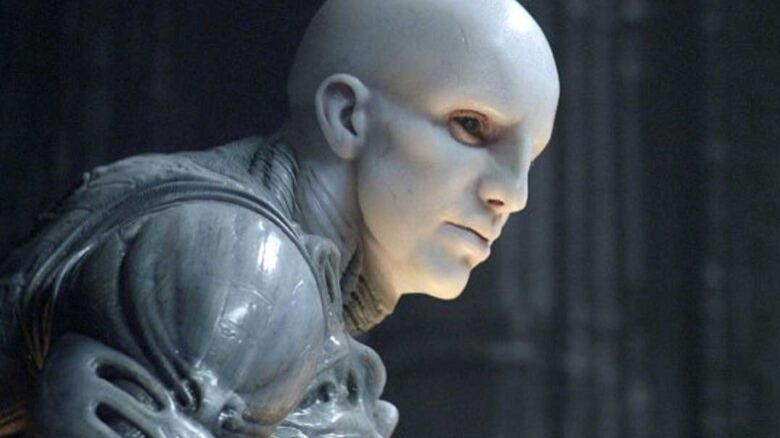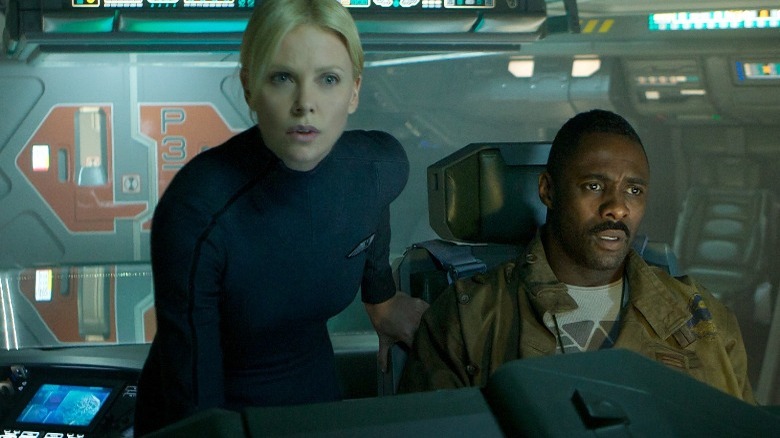Ridley Scott Isn't Afraid To Say He Missed The Mark With Prometheus
Ridley Scott's 1979 film "Alien" is more than just a classic of science-fiction and horror — it kickstarted a massive franchise that inspired a legion of imitators. For a claustrophobic thriller about men and women locked on a spaceship with a killer alien, it was wildly influential. The series kept on trucking.
By 2012, it was largely ignored by the moviegoing public. When Ridley Scott, who hadn't directed a movie for the series since the first, came on board for "Prometheus,” it was a sign that the universe could be revived. A long development process for the film changed it from a follow-up to a direct prequel that expanded on that movie's themes, a philosophical science-fiction film about the origin of human life and man meeting his creator. It proved divisive.
"Prometheus" doesn't include Ripley (Sigourney Weaver) or any of the "Alien" series' other beloved characters. It's set some 30 years before the "Alien" expedition, and explains many of the horrific fixtures we see in that movie. But it's no slavish prequel — it introduces numerous intriguing new characters, like religious archaeologist Elizabeth Shaw (Noomi Rapace) and philosophical android David (Michael Fassbender). And it brought back the horror, scaring even its cast.
Speaking with the DGA in 2010, Scott said, "art's like a shark, dude. If it stops swimming, it drowns." Rather than play the "Alien" hits that would satisfy the series' fans, he wanted to challenge himself.
Now, he's willing to be a bit more candid about whether or not "Prometheus" was a success.
The beginnings of Prometheus
Ridley Scott had made two all-time science-fiction classics with "Alien" and 1982's "Blade Runner," early in his career. It took him a while to return to the genre, part of which can be owed to the tortured development of "Prometheus."
Scott was interested in revisiting the "Alien" series, recruiting James Cameron to direct another film for it, his last having been 1986's "Aliens." Cameron began developing a new film for the squandered series. "Aliens" remained the high-water mark (having featured Sigourney Weaver at her best), but was nearly 20 years old at that point. While opinions vary around the later entries, the return of the filmmakers most responsible for the franchise's success boded well.
But Cameron abandoned the series after 20th Century Fox summoned genre maestro Paul W.S. Anderson to develop the "Alien Vs. Predator" spin-off, based on the Dark Horse comics series. Cameron claimed it "killed the validity of the franchise" in his mind.
Scott, however, remained involved, even while directing films at his typical prolific output. Initially, the film was reported as being a series reboot, one that would turn the focus back to basics: a group of people, locked in a spaceship, with a killer alien on the loose. That might have been more in line with fan expectations, but it's not what Scott ended up with.
How Ridley Scott got the job
"A prequel to 'Alien' is in the works," reported Entertainment Weekly in 2009. The shift from reboot to prequel was significant, marking that bigger ideas were coming. Initially, Scott had recruited a commercial director named Carl Erik Rinsch to do the honors, but Rinsch, whose commercial work demonstrated a unique science-fiction vision, was not the name Fox wanted. That was Ridley. And with screenwriter Jon Spaihts (who would eventually go on to adapt "Dune" with Denis Villeneuve) on board, the train was rolling.
Of course, studio demands continued to shape the project. Following Spaihts' work on the project, "Lost" showrunner Damon Lindelof was brought on for rewrites. Unlike much of the blockbuster screenwriting work Lindelof would do over the next couple of years, "Prometheus" had a lot in common with that show – a similar focus on when man meets the supernatural.
Like "Lost," it would be controversially received. On the movie's release in 2012, fans were finally able to see Scott's vision. According to The Hollywood Reporter, "many fans were not pleased, accusing 'Prometheus' of being drawn out, boring, and too exposition heavy."
Scott bore witness to the reception and kept it in mind while developing the movie's sequel, the bizarre and even more ambitious "Alien: Covenant." He would also go on to express his own opinion on "Prometheus."
How Scott felt about the fan reaction
While promoting "Prometheus," Ridley Scott told Deadline that fans "will recognize strands of 'Alien's' DNA ... but the ideas tackled in this film are unique." But he did not intend to make a movie "for the fans."
It didn't exactly present the thrills of the original. Whatever people wanted from Scott's new take on the series, the film was his own. "Prometheus" ended up a beautifully designed movie that turns the "Alien" formula in on itself. It opens up to reveal more of the original movie's planet, letting its characters' curiosity result in their downfall.
Moreover, it explored the origins of humanity in an intriguing and thoughtful way, conceiving of a group of otherworldly "engineers" that share DNA with humans. It explained, perhaps too much, about the origins of the Xenomorphs of the original series. As if to echo its troubled production, the movie was largely unloved on release.
Scott kept the reaction to the movie in mind while making 2017's "Alien: Covenant." For one, he put a fully-developed Xenomorph in it, having been convinced people still wanted to see it. He also got candid about the "Prometheus" reception, telling Collider, "we discovered that the fans were frustrated... they are the reflection of your doubts." He continued:
"So I thought: 'Wow, OK, I'm wrong'... The fans, in a funny kind of way – they're not the final word – but they are the reflection of your doubts about something, and then you realize 'I was wrong' or 'I was right'. I think that's where it comes in."
The film saw a negative response for its screenplay and for the characters' decision-making, as well as for its "ponderousness." But despite fan consensus, and Scott's own consensus that he might have been wrong, there continues to be defenses for its wild ambition.



